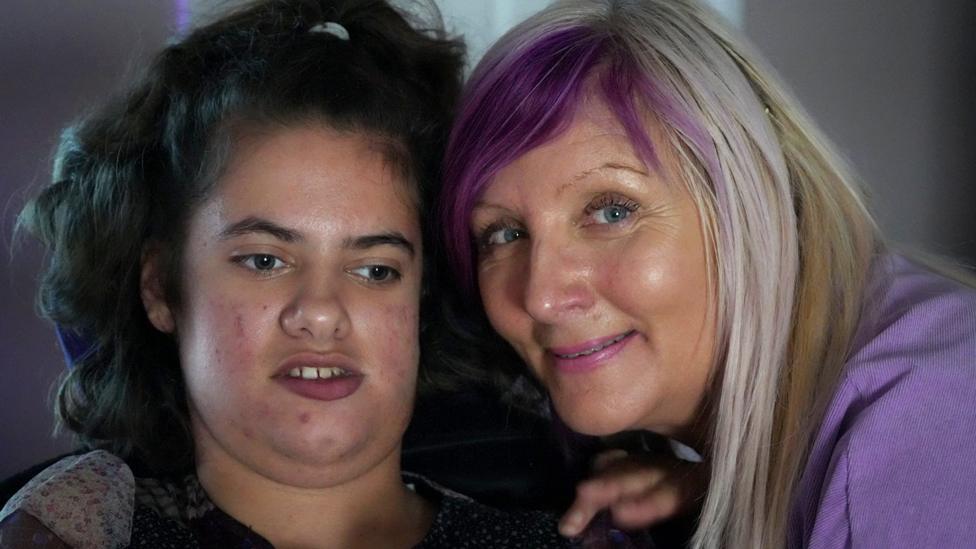Family carers at risk of 'burn-out' amid calls for more respite
- Published
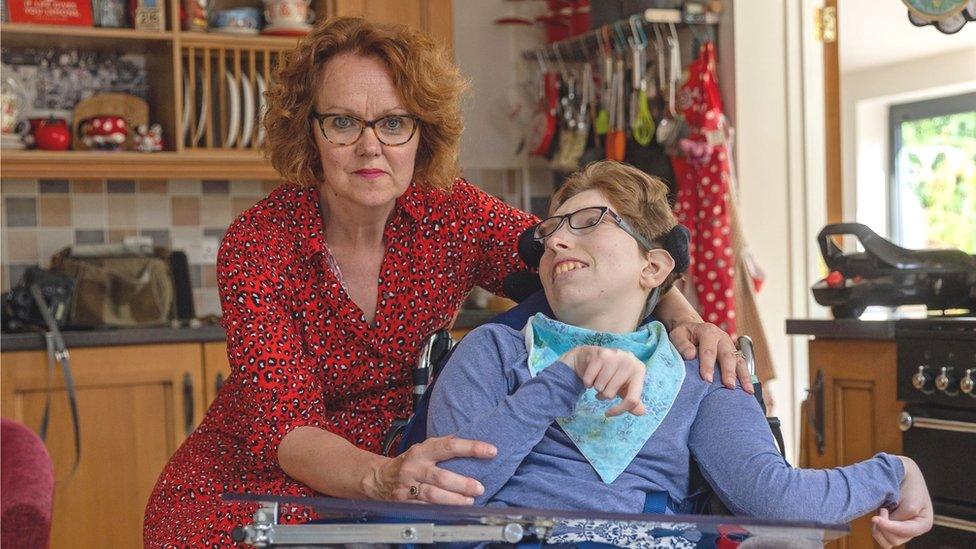
Julie is 54 and lives in Cambridgeshire with her husband Andy and daughter Natalie, 28
Two thirds of family carers are at risk of "burn-out" with some using breaks to earn money amid the cost of living crisis, a charity has warned.
New research shared with the BBC by Sense revealed one in four family carers spent more than 72 hours a week looking after loved ones.
The charity said the needs of families were being neglected and it has called for action.
The government said it was finalising plans for extra carer support.
The pandemic and now the cost of living crisis has made the situation worse."
The research by Sense, a national disability charity, found:
73% of carers surveyed said they were exhausted and/or burnt out, with many delivering round-the-clock care without a break
Families spent 44 hours on average caring for their loved one
A fifth could not remember the last time they could take a break
A third said cost was the biggest barrier to accessing respite services
35% said they used whatever break they did get from caring to do paid work.
The charity's chief executive, Richard Kramer, said: "Caring for someone with complex disabilities is often demanding, non-stop work, and takes its toll physically and mentally.
"The pandemic and now the cost of living crisis has made the situation worse, with carers taking on even greater caring responsibilities and receiving less support, with their health and wellbeing suffering as a result."
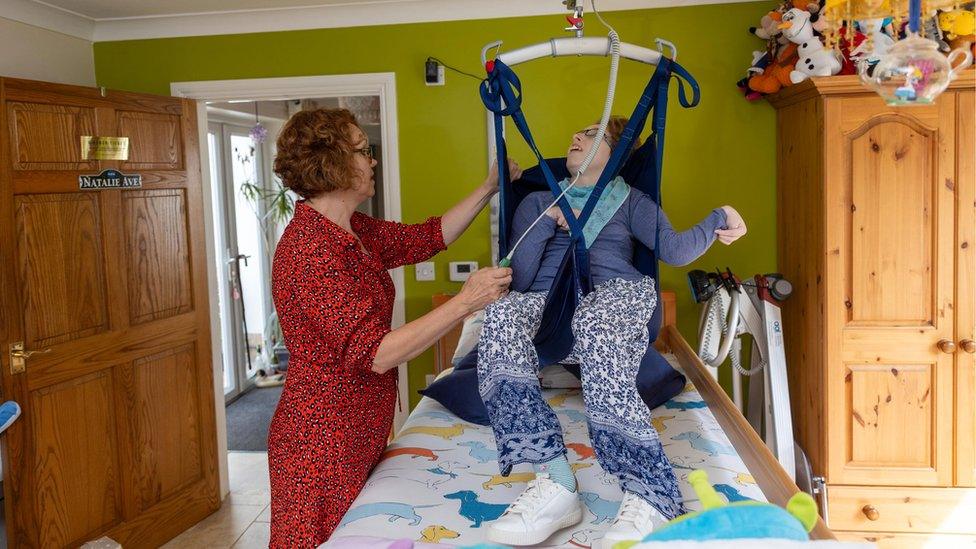
Julie Proud said providing care was becoming harder as both she and daughter Natalie got older
Julie Proud lives in the Cambridgeshire town of Ramsey, with husband Andy and their 28-year-old daughter Natalie.
Natalie has cerebral palsy and learning disabilities. She uses a wheelchair, is non-verbal and only has movement in her right hand.
Mrs Proud said she did not work in order to care for Natalie. Providing that care, the 54-year-old said, was becoming harder as she and Natalie get older.
Natalie attends Sense College Peterborough on weekdays - a specialist provision for young adults with complex disabilities. She also spends three nights a month in a respite home, which Julie said was vital for her as a carer.
"At first I felt guilty accessing respite," Mrs Proud said. "Because Natalie doesn't talk she can't tell us if she wants to come home, and you don't know if she's happy there. However, the staff all know her and we feel happy with the care they provide.
"Having that respite gives us freedom. It means we can go away for the weekend or for a big walk with the dog in the countryside. With Natalie, everything has to be assessed beforehand, we can't be spontaneous.
"Even when we get respite we're still limited though, as we can't go too far in case they call you and say Natalie needs to be picked up.
"Sometimes I do get jealous, seeing our friends do things like go abroad now their children have left home.
"However, I try and focus on what we can do as a family rather than what we can't do."
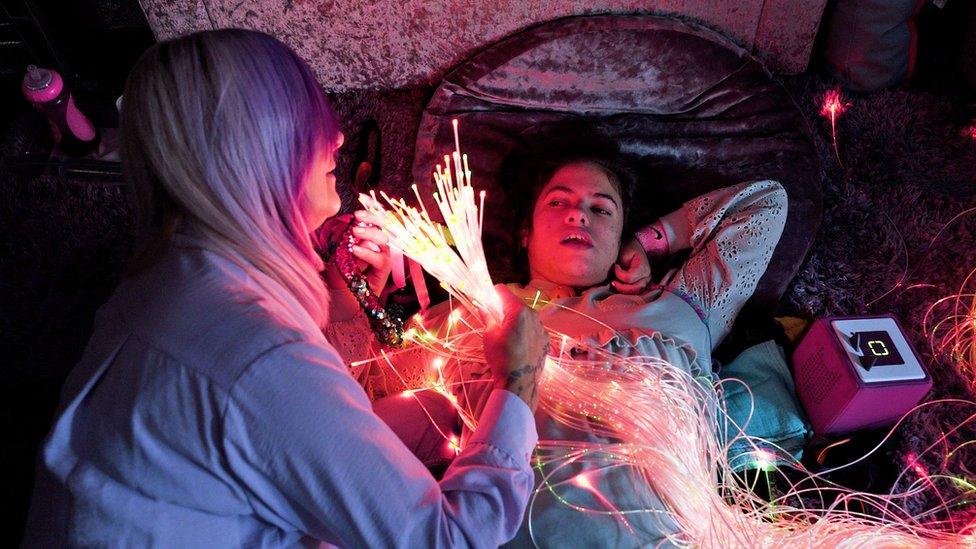
"Rosey and I have a great time together and she is my absolute world," Yvette Clements said
Yvette Clements, 58, lives in Norwich and is a full-time carer for her 24-year-old daughter Rosey, who has complex disabilities including cerebral palsy, scoliosis and blindness.
Last year, Ms Clements feared she might have to put Rosey in care because of the rising cost of living.
"As a carer to Rosey, I am her mum, her pharmacist, her nurse, her friend. I'm all things to her," Ms Clements said.
"Rosey and I have a great time together and she is my absolute world."
However, with that deepest of bonds comes "huge challenges".
"Being a carer can be an isolating experience," Ms Clements said. "When Rosey was a child, I couldn't take her to a soft play area and sit and have a coffee with another mum while our two kids ran around and played together.
"I have to encourage her to play, to engage, to interact - I have to be proactive and on-the-ball at all times."
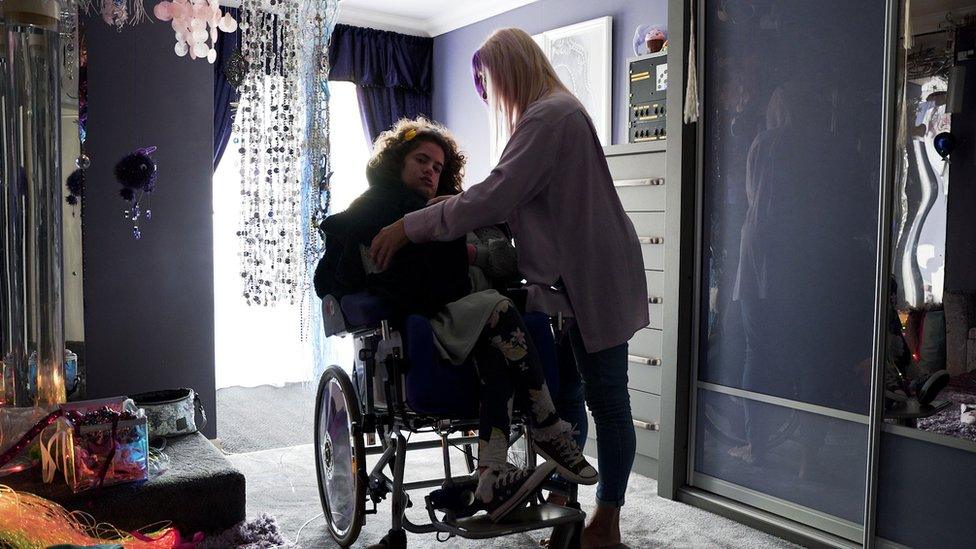
Ms Clements said the two nights a month of respite care did not feel like a proper break
She said getting Rosey out of the house was "a military-style operation".
An emergency "grab and go" bag ready for hospital has been permanently made up and it includes emergency medication and an end-of-life file.
The respite Ms Clements receives from the council amounts to about two nights a month.
"It doesn't feel like respite," she said. "I'm on call 24/7, glued to my phone and waiting to get a phone call that I have to make the 12-mile trip to the service to pick her up.
"Rosey's bones dislocate frequently, so I always have to be on hand to relocate her limbs or accompany her in the ambulance.
"I feel side-lined and isolated. If carers were looked after better and more able to take breaks, we'd be better able to look after our loved ones.
"I am always exhausted and when you're so exhausted, that's when you could run the risk of making mistakes.
"I've never been given training for this role, but I do it and I live it every day."
A Department of Health and Social Care spokesperson said: "Unpaid carers play a vital role in our communities, and we all owe them a debt of gratitude.
"We've earmarked £327m through our Better Care Fund this year to support local authorities with health and care services, including providing carers with advice, support and short breaks and respite services.
"We continue to provide financial support to unpaid carers through the Carer's Allowance, and we are finalising plans for how we deliver up to an additional £25m in support to carers."

Find BBC News: East of England on Facebook, external and Instagram, external. Got a story? Email eastofenglandnews@bbc.co.uk or get in touch via WhatsApp on 0800 169 1830
- Published27 October 2022
